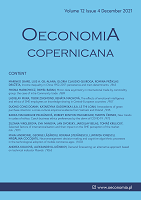The effect of international opportunity recognition processes on problem-solving competence: how does past negative entrepreneurial experience matter?
The effect of international opportunity recognition processes on problem-solving competence: how does past negative entrepreneurial experience matter?
Author(s): Eduardo Terán-Yépez, David Jiménez-Castillo, Manuel Sánchez-PérezSubject(s): Business Economy / Management, Cognitive Psychology, Behaviorism
Published by: Instytut Badań Gospodarczych
Keywords: International opportunity recognition; problem-solving speed; problem-solving creativity; past negative entrepreneurial experience; market opportunity identification;
Summary/Abstract: Research background: Little research addresses how identifying an opportunity in the international market, whether through active search or serendipitous discovery, may have implications for the subsequent gestation behaviors. An emerging body of research suggests addressing this deficiency by focusing on the cognitive and experience-based factors that international entrepreneurs use to develop an opportunity in the foreign market once identified. Purpose of the article: The aim of this study is to explore the role of active and serendipitous international opportunity recognition (IOR) in entrepreneurs? problem-solving skills (problem-solving speed and creativity), as well as the moderating effect of past negative entrepreneurial experience (PNE) on such relationships. Methods: This study used the survey data collection method through an online self-administered questionnaire. Partial least square structural equation modeling (PLS-SEM) method was used to analyze the results over a sample of Spanish international entrepreneurs. Findings & value added: The results show that entrepreneurs that have identified an international opportunity (IO) actively are better equipped to solve problems speedily than those that have discovered an IO serendipitously. In contrast, entrepreneurs who identified an IO serendipitously are better equipped to solve problems creatively. Furthermore, the impact of active search on problem-solving speed is greater for entrepreneurs without PNE, and the impact of active search on problem-solving creativity is greater for entrepreneurs with PNE. Also, it is found that PNE does not moderate serendipitous IOR relationship with problem-solving competence. These findings are relevant as they indicate that the IOR processes have implications for the subsequent gestation behaviors. Thus, the value added of this study is the combination of cognitive and experience-based factors of the international entrepreneur to enrich the link between IOR processes and IO development. These are two intertwined and interdependent processes, which, however, have been scarcely studied as a whole. The results of this research help international entrepreneurs to understand how and why the way they recognized an IO and having or not PNE influence their problem-solving skills during the IO development phase.
Journal: Oeconomia Copernicana
- Issue Year: 13/2022
- Issue No: 2
- Page Range: 541-579
- Page Count: 39
- Language: English

